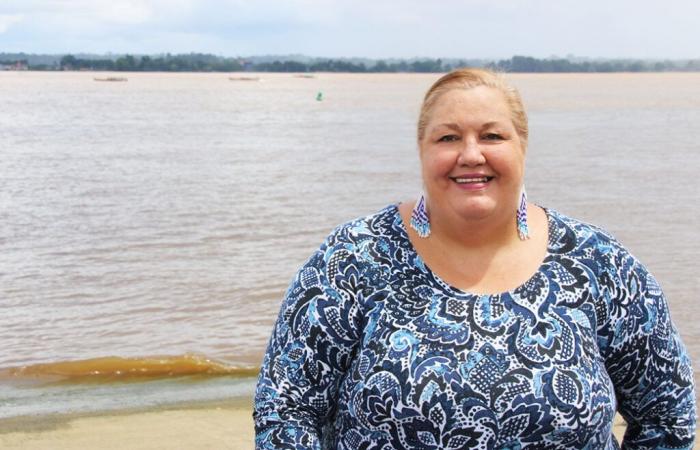Localtis: Robberies, murders, shootings at the police… Your city is facing very strong violence. You asked the Prime Minister for reinforcement and lasting solutions. Michel Barnier replied to you, proposing the sending of a squadron. What do you think of its first elements of response to deal with this security crisis?
Sophie Charles : I have made several requests since the start of the year. I sent three letters, one to the Ministry of the Interior, another to the President of the Republic and another to the Ministry of Overseas Territories. At the end of October, a squadron of 72 gendarmes from the Republican Guard arrived. For us, this is a first response. But our city, which officially has 50,000 inhabitants, in fact has more than 80,000, people in informal areas not being counted by INSEE. It is this differential that poses a problem for us. We had asked for a police station for the urban area and control over the Maroni River because all the trafficking of weapons, drugs and migrants comes from there. It is the gateway to everything illicit. The idea is not to put a gendarme in every square meter but there are modern means, such as drones, to control the border. There are more than a thousand crossings per day opposite Saint-Laurent-du-Maroni. A river brigade was created in April following our requests but it lacks personnel. The positions remain vacant. Perhaps we should create a local competition to have more candidates.
Michel Barnier refuses to abandon the road checkpoint at the entrance to your city which you consider ineffective because it is also supposed to protect the rest of Guyana, what do you think?
Today, there are sixteen gendarmes stuck at this checkpoint. We should put police and customs officers there and free the gendarmes for the rest of the city. More generally, we have seen reinforcements arrive since the start of the year, with foot patrols taking place around 6 p.m. in the city. This has led to a reduction in delinquency and especially crime. The patrols manage to arrest armed gangs of young people, people who are armed, who rob and kill. In response, the population censors itself. I haven't set a curfew but at 9:30 p.m. there is hardly anyone outside. It's a shame because it's a loss of income for restaurateurs.
Beyond security aspects, Guyana, where 53% of the population lives below the poverty line, is suffering from an economic crisis, with an explosion in social demands, insufficient salaries and job insecurity. What is the situation in your city and how do you want to tackle it?
We have 40% unemployment and a real increase in impoverishment. At the municipal social action center, requests increased from 3,000 in 2022 to 10,000 in 2023. We do not yet have the figure for 2024, but this is not going to decrease. Today, there are many small jobs but it is not enough for the development of a big city like ours.
Businesses must be able to come and set up shop to create economic activity and jobs. A few weeks ago, a car dealership was created in our area with fifteen jobs. But with a rapidly growing population – more than 3,000 births each year – security and housing aspects must be improved. We have a large housing deficit in particular. However, when a company comes, it needs land and housing. We are registered in the New National Urban Renewal Program (NPNRU).
On the business side, we are beneficiaries of the Action Coeur de Ville (ACV) program. In this context, we work on the storefront and the renovation of the buildings. This is progressing well. We have two economic activity zones which have been created and which are starting to operate, with construction companies and service companies linked to medical or paramedical services. The aim is to improve the attractiveness of the territory.
And in terms of transport, what is the situation? What are the needs?
The city has no urban transportation. We are in the process of setting up three bus lines to serve the city. We are also planning soft mobility with cycle paths in particular. We try to act on several areas at the same time. And for this, we are requesting possible financing, the Banque des Territoires for certain studies, European funds… We are trying to find financing but it is not easy. And faced with the reductions planned as part of the finance bill for 2025, we are very worried. If we lose the allocation, that's as much as we won't put on the table for investment projects in which we participate. I'm worried about the next three years. The questions that arise about dock dues also worry us. This is practically 50% of our operating revenue. We have a lot of uncertainty.
On the housing side, you are asking for the destruction of informal neighborhoods, around 60% of housing, which are also inhabited by poor families. The prefecture has given its approval for the demolition of buildings in squats, centers of delinquency and places of storage of weapons. What about it?
It is important that these squats, which serve as a refuge for bandits, are destroyed. There is no question of not respecting the law and we carry out the necessary social investigations. But people in an irregular situation must return home. The police must act on this subject, everyone has their role to play. But since she is understaffed, she is struggling. I transmitted information for the demolition of a squat which is located between several schools. It is at the discretion of the prefect who must manage this issue. He agrees, I'm waiting to see.
Are the measures envisaged within the framework of the interministerial committee of towns sufficient for your municipality?
There are things that can be interesting but we have so many specificities that it is difficult to get into common law. In a municipality in France, for example, you have the train. Today, in our city, we are forced to take the car. There are also areas that do not have water or sanitation. Everywhere we have structural delays. For example, I have only one municipal swimming pool! All of this is not easy to cover with infrastructure. In mainland France, school classes are being closed. Since 2020, I have opened 83 classes. In Saint-Laurent-du-Maroni there are 11,000 children in nursery and elementary school, if we add middle and high school students, we arrive at 22,000 students, it's enormous! In addition to the investment cost, there is the operating cost. The measures envisaged by the committee may be suitable for certain municipalities but they are not suitable for territories like mine.
What I especially want is to allow us to do things differently. French and European standards sometimes do not suit us. Today, for example, our territory is very impacted by global warming. A simplification of procedures for the construction of buildings, for example in terms of archaeological excavations, would allow us to move more quickly and start work before periods of rain. The simplification of procedures had been mentioned within the framework of the interministerial committee for overseas territories (Ciom), We have to go through that!






